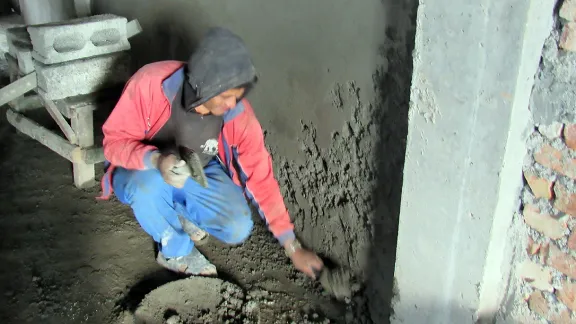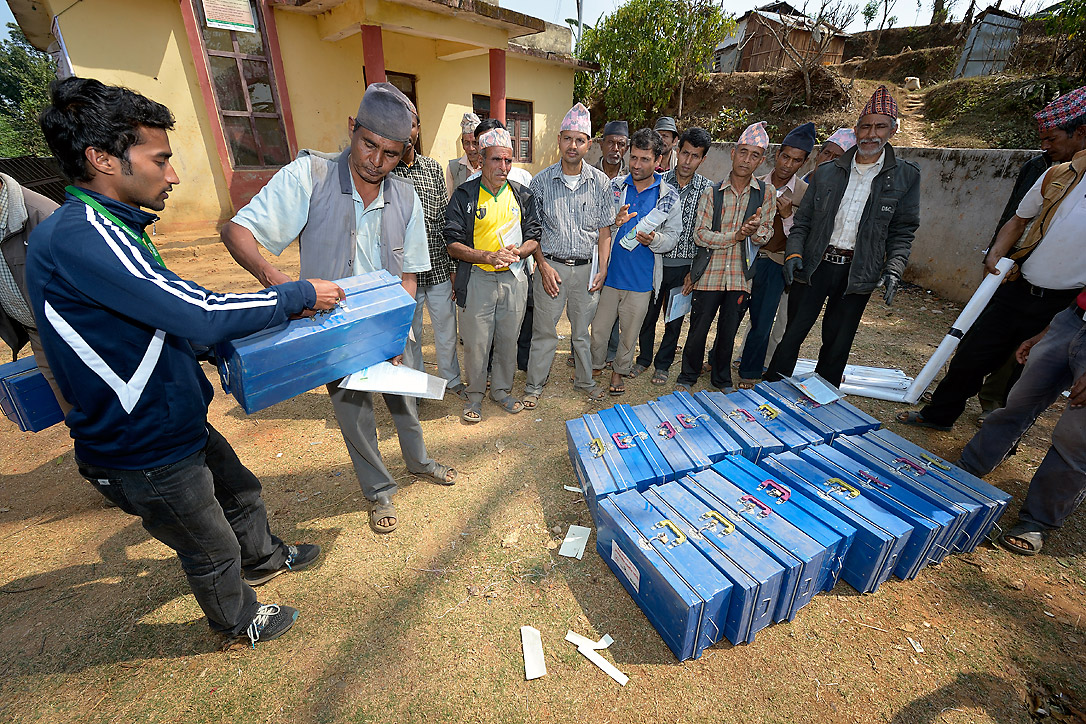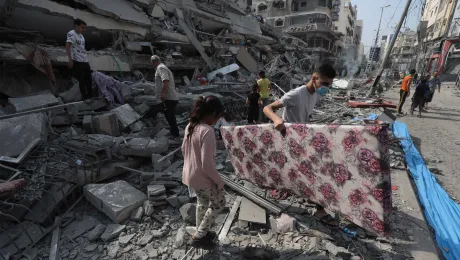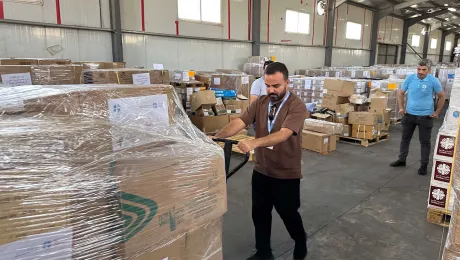
Tashi Tamang working on a house in Ramche. The training by LWF and Islamic Relief taught him how to construct quake-proof houses in the Himalaya region. Photo: LWF/ R. Sedhai
LWF and Islamic Relief Worldwide train builders in quake-proof construction
(LWI) - Tashi Tamang is busy. The 30-year-old mason from Ramche in Nepal’s central Rasuwa district has just finished the two-storey building of Seti Bhume High School in Ramche. Now he is plastering the wall of a four-story house. If the word wasn’t such a bad omen in the Himalaya, one could say he has an avalanche of construction work.
Reconstruction of permanent buildings started in Nepal in late last year, once the Nepali government finally approved new house models. Tamang is one of 90 local carpenters and masons who have received training in constructing quake-proof buildings, a joint project by The Lutheran World Federation (LWF) and Islamic Relief Worldwide (IRW) in Nepal. Facilitated by the local Batas Foundation, the young artisan attended a nine-day workshop on construction.
Hard-hit by 2015 earthquake

A woman constructs a makeshift shelter in Goljung village, Rasuwa – one of the areas where LWF has just finished training masons. Photo: Paul Jeffrey/ACT
For Tamang and his neighbors, the shock of the 2015 earthquake still sits deep, even a year and a half later. Nearly all the houses in the community were completely destroyed, severely affecting more than 10,200 people. As political instability and protests slow down reconstruction work, many people still live in makeshift shelters – among them the elderly, pregnant women, young mothers and thousands of children.
The lack of a functioning sanitation network means the women walk long distances to fetch water from nearby streams - an unsafe source - as the destruction of sanitation also led to an increase in open defecation.

LWF project areas in Rasuwa, one of Nepal’s most remote districts close to the border with Tibet. The communities here were among the worst affected by the earthquake, but only received assistance very late. Image: LWF
As his last name indicates, Tashi Tamang belongs to the ethnic Tamang community, one of many indigenous groups in the Tibetan border area that live off agriculture or from work done at home. Many were extremely vulnerable before. With the disaster, they lost their livelihoods. The families, often poor and illiterate, had little or no reserves to fall back on.
Help to re-build themselves
LWF and Islamic Relief have identified five communities, so-called village developments committees, of Gatlang, Goljung, Chilime, Yarsha and Ramche in Rasuwa. After discussing the situation with the local population, it was decided they would receive support in reconstructing their houses and communal buildings, the sanitation network and livelihoods, but that they would implement the aid themselves – a meaningful way to bring new skills and resilience to the community.
People who know how to build and construct safely are scarce in remote settlements like Ramche. Training people like Tashi Tamang means creating an important local resource.

A man nails on tin roofing provided by the ACT Alliance as he puts the finishing touches on a transitional shelter in the village of Goljung, in the Rasuwa District of Nepal. Photo: Paul Jeffrey/ACT
The project targets vulnerable communities, in particular, aiming to expand the existing skills of local workers instead of giving projects to outside companies. Those worst affected have received new livestock, such as goats and chicken, or cash grants to open new businesses. LWF and IRW distributed building material to 2,042 families and trained local artisans in building techniques.
In total, 90 locals artisans were chosen to receive masonry training in earthquake-resistant technology following a curriculum for rural masons, developed by the Nepali Ministry of Urban Development. After completion, the masons also received a set of new and in most instances, better tools.

Distribution of new tool boxes to locals masons, who have been trained by LWF, IRW and other AT Alliance partners. Photo: Paul Jeffrey/ACT
“People who know how to build and construct safely are scarce in remote settlements like Ramche,” says Dr Prabin Manandhar, LWF Country Director in Nepal. “Training people like Tashi Tamang means creating an important local resource.”
Tamang, who worked as a mason and day laborer since he was 18 years old and used to earn the equivalent of 5 USD per week before, has easily doubled his income and a long list of work orders now. “I am happy, this has not only given me an advantage in business, but also enabled me to build better, earthquake-resistant houses,” Tamang says with a smile.
An increasing number of people have been approaching him to construct their new homes. Tamang has also retrofitted more than five houses which were damaged by the earthquake. Now he faces the difficulty of meeting his demand.
“I feel like I have been transformed,” he says. “I have better skills and better tools. But what is most important, I know that my houses will keep their inhabitants safe if another earthquake occurs.”
A contribution by Ram Sharan Sedhai, LWF Nepal. Edited by LWF communications.


